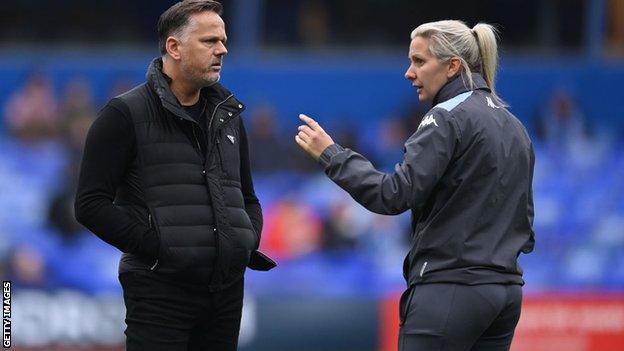What next for Birmingham City women as they hunt for third manager in seven months?
- Published

Scott Booth and Carla Ward have both left Birmingham City within the last seven months
Birmingham City are in the hunt for their third women's team manager in less than seven months - but are the problems deeper rooted than those on the pitch?
When Carla Ward resigned in May - a year before her contract ended - it was following a season of turmoil, during which it got to the stage where players wrote to Birmingham's hierarchy to protest at issues regarding facilities and resources.
Earlier that season, Birmingham had pulled out of a league fixture because of a shortage of available players and the team also had some fixtures at their previous Damson Park home postponed because of the poor condition of the pitch.
But it seems a number of these issues have still not been addressed by the club.
Scott Booth, who agreed a three-year contract in June following Ward's departure, was sacked on Thursday after just seven Women's Super League games in charge.
He took the job expecting change but BBC Sport understands members of the women's set-up have still been made to feel "second-class" within the club.
Players have continued to raise issues through a leadership group within the team, while Booth faced constant battles with those higher up to improve basic facilities and logistics.
In response to BBC Sport, the club said they "have sought to address many of the concerns that players raised last season".
They added: "The training facilities remain a challenge for everyone at the club and are not limited to the women's team. Staff across the club continue to work together to ensure that all our teams are catered for to the best of our ability.
"This [the claims] feels like a lazy attack on the club, based primarily on last season, whilst staff are doing all they can to improve the situation for everyone concerned."
It is though understood it took several months for the women's team to be given a regular training slot - often having to change pitches and wait for the schedule of youth teams to be decided.
Use of gym facilities was also restricted by schedule with the women largely only able to use them later in the day.
The use of the club's canteen was often restricted to outside of regular meal times, while players washed their own kit for the first few weeks of the season before a facility was put in place.
They have also been using two small dressing rooms - often used by youth teams - which sources say was "inadequate" for the women.
Why was Booth sacked?

Scott Booth won six Scottish league titles with former club Glasgow City
The sacking of Booth came as a shock to both players - who he is believed to have been popular with - and staff members.
He arrived with an impressive CV, having guided Glasgow City to six SWPL 1 titles and two Scottish Cups in six years.
In a club statement, general manager Sarah Westwood said "results have fallen short of our expectations" but staff believed their goal was to avoid relegation.
As it stands, Birmingham sit one point above bottom club Leicester City.
The club added that team form was the reason for changing manager.
"The decision was made to part ways with Scott because of a poor run of results," they said.
"We have players who are representing their respective nations on the international stage and a group with enough ability to start winning games in the WSL.
"Scott had differing opinions on how the club should operate. Ultimately it is the lack of points on board and below par performances which was the catalyst for change."
Where do the club go from here?

Birmingham lost 1-0 to rivals Aston Villa in the second city derby last weekend
These are worrying times for Birmingham's fans - their team have the WSL's lowest playing budget in the WSL, another managerial recruitment process is under way and transfer activity is on the back burner with just over a month until the January window opens.
But if last season's public outcry from players and Ward's resignation failed to enforce change, will anything develop following Booth's sacking?
In May, Xuandong Ren resigned as chief executive, and there was hope that the change might provide the impetus for the club to make the women's team a greater part of their operation.
However, investment is still lacking and - despite the women's home matches moving to St Andrew's this season - there remains a disconnect.
As recently as 2017, Birmingham were FA Cup finalists. Less than 10 years ago, they were challenging for league titles.
But if the women's team are to succeed in the WSL, Birmingham must match the investment of clubs coming into the league - such as Leicester City - and those around them in the table.
Whoever replaces Booth has a tough job, as a rebuild is needed off the pitch as well as on it.